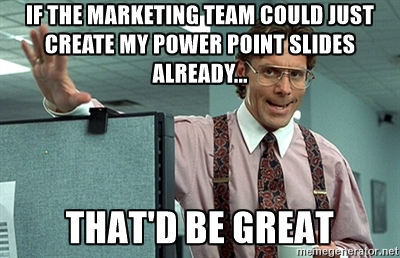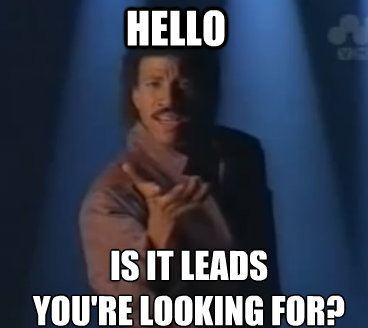
This is a topic that really intrigues. In part, simply because it’s a VERY frequently discussed topic and considered issue.
Check it out, from a simple Google Search:
- Why Marketing and Sales Don’t Get Along – From Grow and Convert
- Why Sales and Marketing Don’t Get Along – Via Harvard Business Review
- 3 Reasons B2B Sales and Marketing Don’t Get Along (and How To Fix It) – Penguin Strategies
- Why Sales and Marketing Don’t Get Along – and How to Fix It – Tyrannosaurus Marketing
- Why Sales Hates Marketing: 9 Reasons – Published in Inc.
- Them and us: Why don’t sales and marketing get along? – mycustomer
- Why your sales and marketing departments hate each other – The Globe and Mail
Might we agree at least that something is amiss?
I think we Marketers should fall on the sword. I’m sorry. Something changed and we’ve done a poor job of maintaining the responsibility of our role.
What we’re responsible for causing and what we’re dealing with in today’s economy is that most people “Marketing” aren’t actually doing marketing, they’re doing Promotions (Facebook ads, email, Adwords, etc.).
And the challenge inherent in *that* is that businesses perceive that work as “marketing” and thus change their perception of Marketing.
When we run promotions, we (rightly so) expect results in the form of engagement – comments, likes, leads, and conversions.
Yes? You do. I presume you do. I do.
Thing is, that’s not Marketing.
That is work that “Marketing” does, having determined that the business must. But when someone sells you “Marketing,” or you seek Marketing and it’s really just running email campaigns and Facebook ads, they aren’t Marketing.
Begging the fundamental question: why do we do that in today’s economy?
Article Highlights
WHY Marketing is Perceived as Promotions and Lead Gen
Because the internet screwed everything up.
Think about 25 years ago or so.
Good old fashioned Marketers were thrust into this online world in which they have (had) no idea what they were doing. Search Marketing??? Social Media?! Targeting?? Even the idea of “CPM” was completely new and foreign to media buyers of the time.

On the other hand, you had young online savvy professionals learning those very skills but with no experience nor (necessarily even) education in traditional Marketing. Thus, a ton of people who could “offer” Adwords, SEO, Facebook Advertising, etc. and effectively and efficiently spend the company budget, FAR more effectively than those ‘ignorant‘ Marketers could; companies started replacing Marketing with these skills.
But remember, that isn’t actually Marketing.
These people aren’t doing the work of determining the Product, Price, Placement, Positioning, etc. (See 4Ps of Marketing) to TELL the business what to do. They’re merely promoting what you have/are.
That tends not to work well. The business suffers and devolves into a focus on less expensive but qualified Leads so that Sales can close business. Without any real direction as to what to do. With no regard for competitors or the market-at-large. At best, the business stagnants.
WHAT IS MARKETING?
Economist Peter Drucker put it eloquently: The purpose of Marketing is to make Sales Superfluous.
Think about that.
IF your business is actively selling, with people; or if it MUST promote to get customers, it isn’t Marketing as effectively as it can.
Because Marketing is the work of figuring out the right product, price, placement, positioning, etc. to provide what the market WANTS.
No one sells you a Coca-Cola, or an iPhone, or Google Ads.
Why? Because those are products and brands so well Marketed that they don’t need to SELL them to you.
For decades, economists have noted that only two things create value in business: innovation and marketing. Everything else is a cost of doing business.
Yet… we’re exploring here the notion that Sales is the critical of the two. You’ve been led to believe so.
And this online ability to promote a business and drives leads is akin to Sales. Pushing a message to potential buyers and working to convert them. The purpose of actually Marketing is to figure out how to not even need to do that… yet businesses today perceive doing that very thing as “Marketing.”
Innovation and Marketing being paramount is evident in a company like Apple, where Marketing distinguished it from PCs. It’s evident in Marketing then figuring out how to make such Smartphones cheaper, better, and faster, through companies like Samsung and Google. Did anyone SELL you that Pixel or did you choose it over iPhone for some reason? Marketing.
When the internet took over, many realized that they could spend little to get leads and customers (AdWords, email, SEO, etc.).
This perverted what people think of as Marketing.
Marketing became what you did to sell a product.
Then it got worse.

Because it is easy to acquire customers (and it is), startup books and advisors started saying “it’s all about the customer!!” and while they’re not wrong, the economy evolved to perceive that what matters most is Sales. Moreover, that you pay for Sales(evident in our question of priorities).
It is all about the customer but as a startup you don’t actually have a customer, you haven’t even really created a customer for a new product or service, if you can’t sustain your business and compete in the market.
Selling a mattress to a customer does not mean that you’ve effectively established a new mattress company — let alone a market for mattresses, an innovation in mattresses, or a brand as a mattress business that people want.
The Job of Marketing is to Make Sales Superfluous
That’s how you need to prioritize marketing. Marketing is the work of knowing the market, competitors, pricing, what works and what doesn’t, what to prioritize so as to remain competitive.
If you don’t do that first, foremost, and with focus at the start and end of every day, how they hell do you know what to do??
I had a fantastic discussion, a couple years ago, offline, in which some Product Executives noted that 15+ years ago, Product was a division of Marketing (see: the 4Ps – or more Ps – of Marketing).
Your Product is the Result of the Market
When the internet dawned and engineers and developers took over the development of the products of today’s economy, and Marketing was relegated to doing affiliate marketing or email to promote those products, the VP of Product emerged as a role; distinct from Marketing. Suddenly, Product was its own business unit.
Interestingly, that shift coincides with the same philosophies emerging in the startup ecosystem:
The Product Market Fit comes to mind… We HAVE a Product and need to fit it INTO the Market.
The Problem Solution Statement is another concept that reflects this shift — There is a Problem, we *have* a Solution. That’s what Sales says.
Neither of those perspectives reinforce that the work of the Market is what determines the Solution the Market wants, nor that the Product developed is a reaction to the Market: not a square peg looking for a square hole.
“Marketing” would instead apply a Market Product Fit approach (there is the market, this is the product we should provide) or a Solution Problem Statement (Coca-Cola is refreshing, why? Because you’re thirsty)
And the result is what customers want. Something that need not be actively Sold.
Both ideas, as coined, helped usher in the belief that a Product focus, validated by Sales and customers who affirm that the Product has market, is the right way to go.
Therein and therefore, Marketing is done once you’ve established that and have some revenue (or investment) to spend on advertising.
Promotions and leads to sell that. Oops.
How do you know how, where, and what to advertise?? How does Sales know what to say and how does the company know what to build?
Consider the evidence of this idea that Marketing makes Sales superfluous. The most successful innovations have never had someone Sell to you:
- Apple and Banks consistently come out as the most successful companies in the world. How’d that cold call about the new iPhone go?
- Toyota is near the top of the list and yes they sell you a car when you walk in the dealership but you walk in the dealership for a reason
- Google’s Analytics, Adwords, Android, Apps? — you want them
- Uber? The company has had their challenges but we all sought it out for what it is
- Salesforce… Facebook… Amazon (ironically)… WhatsApp
They don’t sell you. No one calls to pitch you. They aren’t trying to close you.
Why?
They know their customers, what the customers want, and what to offer and how, so that customers seek them out.
Marketing.
Having to do Sales is the very definition of a company failing: If you aren’t doing what your customers want, you have to go after and physically tell them.
Examples of that? My favorite example is Solar. I want solar on my home, I really do.
Solar might be the worst marketed innovation in recent decades.
I have no idea how it works, what it should cost, how I’ll benefit, if I can do it myself… the entire industry is fixated on Selling it precisely because the industry isn’t doing anything its customers actually might want. There are no major brands or dominant companies as a result — Focusing on Selling Solar created a marketplace in which everyone has to manually sell it, preventing anyone from emerging the leader because the consumer can’t just get it.
Have you ever talked to a Solar franchise, local representative, or installer? “I want solar on my home, how much will it cost?” “Well… that depends.”
Follow that logic through. I want it, I’m ready, I’m seeking the solution at a price the market will support… and the industry can’t deliver that which the market wants.
Oops.
Worse, founders and business owners then perceive that they should be focused on Selling rather than treating their early sales work as a cost of doing business – market research. This behavior is a reaction, given a failure to distinctly create value for the market.
Startup Founders: You sell. You personally sell until you know how you can avoid having to do so.
okay, maybe you commission people for that and hell, as a seed stage startup, give Sales 80% commission. Give them everything, for getting you traction and answers; the pittance income isn’t going to make any difference anyway as what you need to figure out is how to serve the market without having to Sell to it.
Notice that? When you are selling you must consider it not Sales, but obligation under Marketing — you are doing customer discovery and if you expect revenue from the efforts of Sales, at this point, more than you value Sales figuring out how to put itself out of the job, you will fail. It’s an obligation, not a priority, so that you can determine how to stop selling and start closing business from demand.
That investment is in what’s called Marketing:
- Attracting or hiring an experienced team that knows your industry, niche, and competitors
- Budgeting to efficiently create awareness and demand where your customers can be found
- Investing in figuring that out
- Funding the development of a front end User Experience, Brand, and Product that people want
Those are Marketing expenses and in allocating for them, you distinguish yourself in the industry, create customers, and alleviate the cost of doing Sales.
I’m falling on the sword on behalf of Marketers because most aren’t Marketing. We have this disconnect with Sales now because you want more sales, and Marketing isn’t delivering what it should be so that your business actually grows without needing to Sell.



“Most marketers aren’t doing marketing, they’re doing promotion”
I’m paraphrasing, but he’s right. And most aren’t even doing that – they’re doing publicity.
Fixing sales & marketing cooperation is easy – but it requires you to forget everything you thought you knew!
Excellent! Marketing has become a synonym to advertising and this article just shows how plain wrong it is.
If I’m understanding you properly, what you’re basically saying is that marketing makes you become the hunted rather than the hunter.
In other words, marketing encourages buyers to actively seek you out and buy from you rather than you having to seek out buyers and compel them to buy from you.
Is that what you’re saying?
I think that’s a great way to put it!
Alright! And, of course, the way to pull that off is to build a good reputation, become a leader in your given market or field, and be ever-present in the market, right?
I think this strategy makes perfect sense for B2C businesses but not for B2B. If I am in lets say the Capital Software business and the average sale is $150K, then the way that Marketing Makes Sales Superfluous is by identifying prospects that have a need that your product can solve. Sales then has to take the the lead that has been qualified by marketing or an inside sales team and take it through a sales process to close. Branding and positioning is important. These are functions of strategy and should be driven by the C-Suite. But then marketing and sales align to drive demand and close the business.
Only if the price requires negotiation. Enterprise software and hardware is sought and purchased all the time without having to deal with Sales.
My mum always told me that good things sell themselves in the market. I agree because, if you have what people need, they would adjust every other financial variable and constraints in other to make you a mathematical constant of their purchasing scale of preference.
In a nut shell I agree with your thought train.
Thanks for sharing